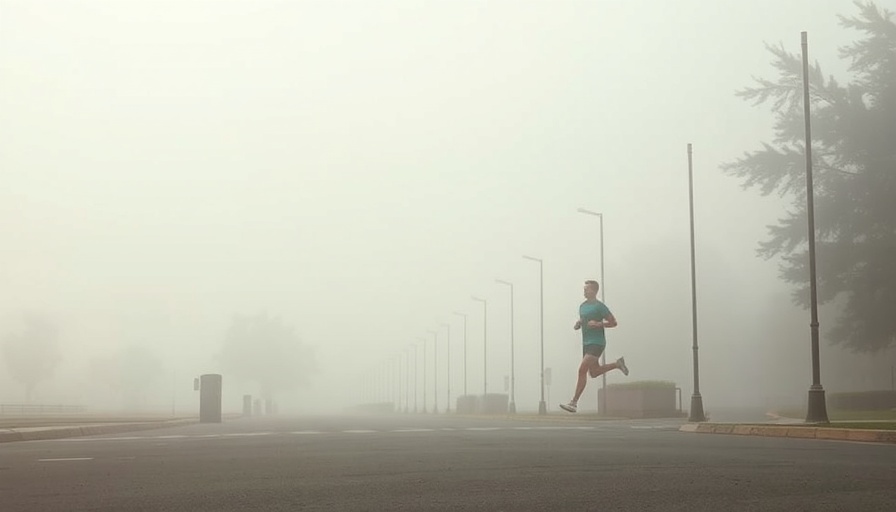
The Global Air Pollution Crisis: Urgency in Action
A recent report by the World Bank titled Accelerating Access to Clean Air on a Livable Planet points to a staggering fact: with concentrated policy measures, the number of individuals exposed to hazardous levels of air pollution could be reduced by 50% by the year 2040. This is particularly significant for low- and middle-income countries, where the burden of air pollution is felt most acutely. Urgent action is no longer an option but a necessity.
In the video titled "World Bank: Effective Policy Measures Could Alleviate Air Pollution by 2040", we delve into the critical insights surrounding air quality management—insights that prompt further exploration of effective solutions.
The Economic Toll of Air Pollution
According to the report, outdoor air pollution costs the global economy approximately 5% of GDP, translating to billions of dollars that could otherwise contribute to development and welfare. Yet the economic factors tell only half the story. Every year, outdoor air pollution is responsible for around 5.7 million deaths, predominantly in low and middle-income nations, where a staggering 95% of these fatalities occur. Unchecked, the ramifications ripple through economies, healthcare systems, and families, deeply impacting livelihoods and social stability.
A Call for Collective Action
As the report emphasizes, air pollution respects no borders; it is a global crisis that necessitates unified efforts. Collaboration between governments, international organizations, and civil societies is crucial in driving real change. National policies must align with global best practices to ensure lasting improvements. The urgency to create a breathable and livable future for upcoming generations hinges on our ability to act decisively now.
Human Factors Driving Pollution
Human activities are the primary culprits behind outdoor air pollution, predominantly through industrial emissions, vehicular exhaust, and agricultural practices. Therefore, reforming these policies could drastically reduce harmful particulate matter in the air, improving public health. Innovations in technology, such as cleaner energy sources and improved regulatory frameworks, can be pivotal in tackling this pressing issue.
Making the Invisible Visible: Health Risks
It's crucial to understand how many individuals may be living unaware of the dangers posed by poor air quality. Microscopic particles from polluted air can lead to chronic respiratory diseases, heart conditions, and even cancer. Low-income communities, often situated near industrial sites, are at a heightened risk and bear a disproportionate health burden. Policies addressing air cleanliness must account for these vulnerabilities to ensure equitable health outcomes across all demographics. Overcoming complacency will be pivotal; the potential for improved public health through clean air must be prioritized.
Opportunities for Policy Innovation
The World Bank report highlights potential actionable insights where targeted policies may yield significant benefits for air quality. This includes enhancing public transportation to reduce reliance on personal vehicles and transitioning to renewable energy sources to decrease emissions. Furthermore, investments in green infrastructure and community education on pollution reduction strategies can foster grassroots support for clean air initiatives.
The Path Forward: Monitoring and Adaptation
Efforts to combat air pollution must be accompanied by rigorous monitoring systems to track progress. Governments should establish clear benchmarks to assess the effectiveness of policies implemented. This accountability can help in adapting strategies that may not be yielding desired outcomes, ensuring that nations are on track to meeting their air quality goals.
The Role of Public Engagement
Public awareness around air pollution is essential to mobilize collective action. Civil society has the power to advocate for cleaner air standards and can hold governments accountable through activism and informed voting. Promoting educational campaigns that detail the immediate and long-term impacts of pollution can cultivate citizen engagement and galvanize community-level changes.
Conclusion: Why You Should Care
With the looming deadline of 2040 to halve hazardous air pollution levels, the time for decisive action is now. This is not just a matter of health but of economic and social integrity across nations, particularly in vulnerable regions that bear the brunt of environmental neglect. Addressing air pollution is a cross-cutting challenge that affects various aspects of life, from economic growth to public health. Thus, as professionals, it’s imperative to engage with policy dialogues and push for actionable changes that foster cleaner air for all.
The World Bank’s findings urge us not only to acknowledge the issue but to prioritize it within public discourse and political agendas across the globe. Together, we can champion the cause of clean air and a livable planet, ensuring a brighter future for generations to come.
 Add Row
Add Row  Add
Add 




Write A Comment